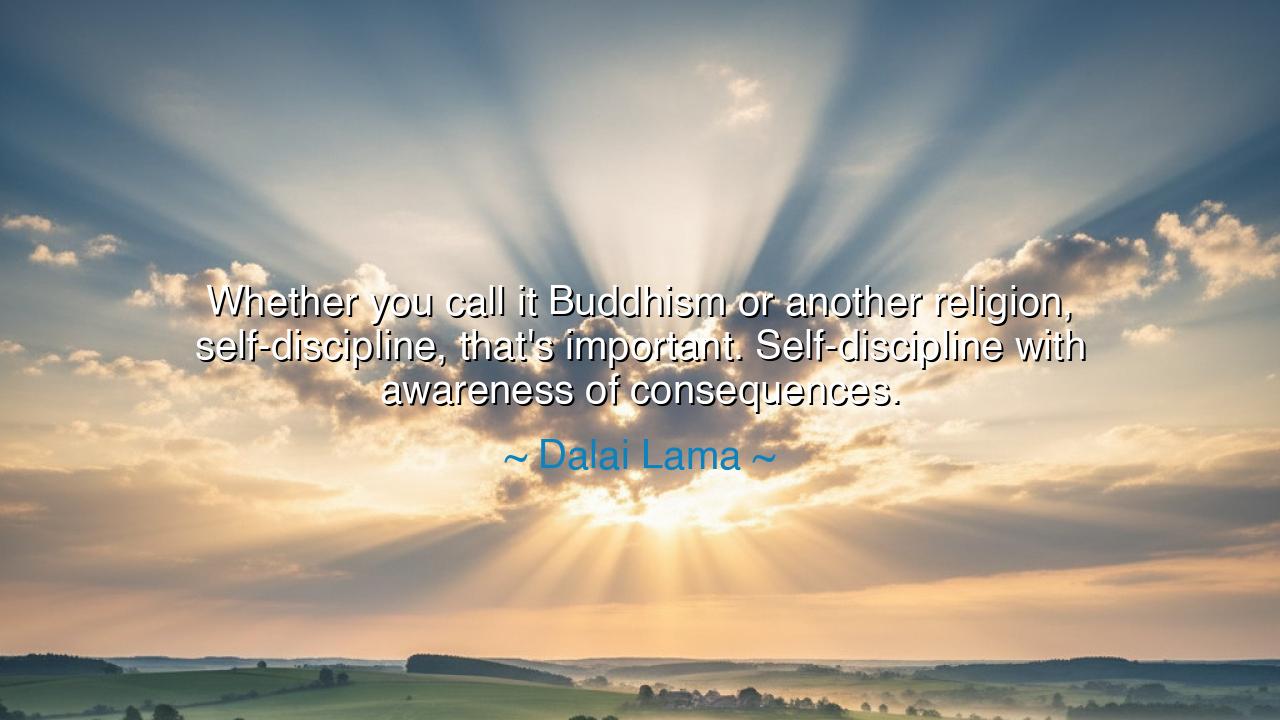
Whether you call it Buddhism or another religion
Whether you call it Buddhism or another religion, self-discipline, that's important. Self-discipline with awareness of consequences.






In the vast expanse of human wisdom, across time and cultures, there is one truth that remains unshaken: the importance of self-discipline. Dalai Lama, a figure of profound insight and compassion, speaks with clarity when he reminds us that regardless of the faith we follow, self-discipline is the foundation of spiritual growth and personal transformation. “Whether you call it Buddhism or another religion, self-discipline, that’s important. Self-discipline with awareness of consequences.” These words resonate deeply, for they call us to examine the power we each hold over our own lives—our ability to shape our actions, choices, and destinies through disciplined, mindful behavior.
In the ancient world, self-discipline was revered as a key virtue, one that shaped the path toward wisdom, virtue, and inner peace. The Greeks spoke of Sophrosyne, the virtue of self-control and moderation, as the foundation of a well-lived life. For Socrates, true knowledge came not just from understanding the world around us, but from controlling our own desires and impulses. Likewise, Buddhism, which began in ancient India, teaches that the path to enlightenment is not one of indulgence but of discipline—the Eightfold Path is a guide to right understanding, right action, and right living, all underpinned by the practice of self-control. This is the discipline the Dalai Lama speaks of—one that leads us toward awareness, clarity, and purpose.
The role of self-discipline in spiritual traditions can be seen in the life of Gautama Buddha, whose journey to enlightenment began with a strict discipline of both mind and body. After years of indulgence and excess, Buddha turned to extreme self-denial, seeking to purify himself through asceticism. But he soon realized that balance—not excess or deprivation—was the key to overcoming suffering. It was through the discipline of moderation and mindfulness, combined with an awareness of the consequences of his actions, that Buddha attained the wisdom and peace he sought. His life exemplified the profound truth that self-discipline—balanced with awareness—is the key to spiritual freedom.
The lesson from Buddha’s journey is profound: self-discipline is not about rigid control or repression, but about aligning our actions with our deeper values and understanding the consequences of our choices. Consider the example of a skilled archer. To hit the target, the archer must have discipline—a steady hand, a focused mind, and careful consideration of each movement. The discipline is not just in the action, but in understanding the result of that action. So too is self-discipline in life; it is not merely about abstaining from indulgence, but about understanding the impact of each choice, whether it is in our relationships, our health, or our spiritual practice. The awareness of consequences helps guide us to live intentionally and with purpose.
We can see this in the lives of many great figures throughout history who exemplified the power of self-discipline. Take, for instance, Nelson Mandela, who endured 27 years of imprisonment for his fight against apartheid. Despite the harsh conditions, Mandela maintained a discipline of mindfulness and hope. He understood that his actions, even in prison, would shape not only his own life but the fate of his country. His self-discipline was not merely a matter of personal endurance, but a spiritual commitment to a vision of freedom and justice. By maintaining his focus, his calm, and his purpose despite immense adversity, Mandela’s life teaches us that self-discipline, coupled with a clear awareness of the consequences of one’s actions, can change the world.
Dalai Lama’s words are not just a call for spiritual discipline but for balance and awareness in all aspects of life. True self-discipline comes from understanding that our choices ripple outward, affecting not only ourselves but also those around us. The discipline to rise early, to focus our energies on what matters, and to avoid harmful indulgence is essential—but it must be rooted in an understanding of the consequences of our actions. Every decision we make carries weight, whether we realize it or not. The ancient wisdom of karma—the belief that every action has a consequence—reminds us that our choices matter deeply, and that awareness of this truth must guide us in our pursuit of peace and enlightenment.
Thus, the lesson from Dalai Lama’s words is clear: self-discipline is not merely about restraint or limitation, but about understanding the full impact of our choices and aligning our actions with our highest values. Whether through prayer, meditation, or daily actions, let us cultivate this discipline with awareness. We must strive to be mindful of the consequences of our actions, to live intentionally, and to shape our lives in accordance with the deeper truths that guide us. In doing so, we move closer to the peace, wisdom, and fulfillment that comes from living with purpose and integrity. Let us walk the path with steady steps, knowing that each choice we make carries us toward a brighter future, both for ourselves and for the world around us.






AAdministratorAdministrator
Welcome, honored guests. Please leave a comment, we will respond soon